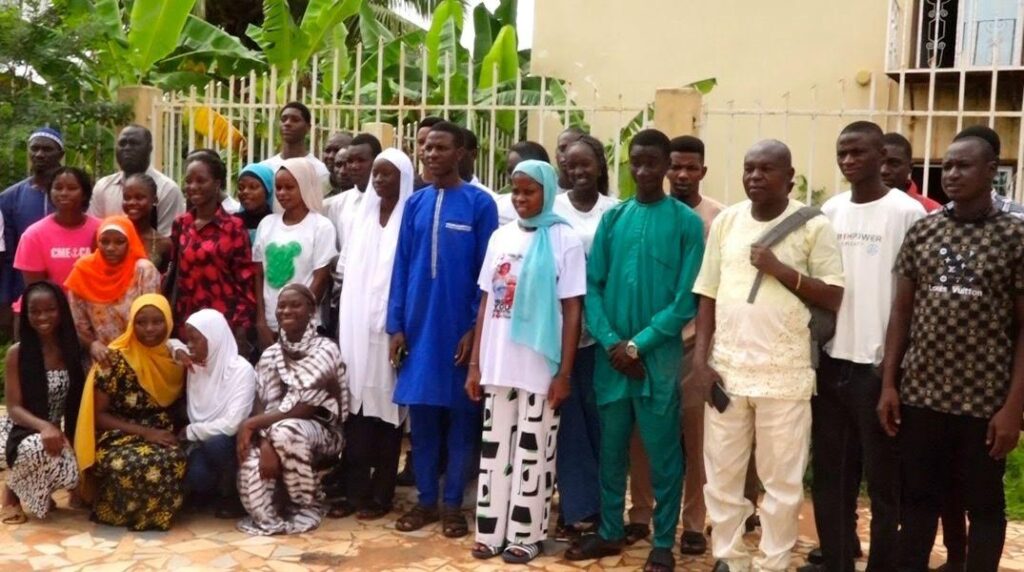Open Media Centre and Partners Launch 3-Day Media and Information Literacy Training

By Ramatoulie Jawo
The Open Media Centre, in collaboration with Malagen and UNESCO, has launched a 3-day training program for senior secondary schools across the country.
This initiative, part of the project “Strengthening the National Infrastructure for Peace to Promote Social Cohesion in The Gambia,” is funded by the United Nations Peacebuilding Fund. The training focuses on Media and Information Literacy, aiming to counter hate speech and promote responsible digital citizenship.
The project seeks to train and empower young Gambians to become responsible, critical, and ethical citizens in their online engagement, as part of efforts to address hate speech.
The project began its implementation last year by conducting a national Forum on Hate Speech as part of the events marking the 2023 UN International Day for Countering Hate Speech. It has also trained more than 170 senior secondary students across the country through national and regional step-down training which ended in April 2024.
At the opening ceremony, Kebba Jeffang, Head of Monitoring and Fact-Checking at the Open Media Centre and Malagen, provided an overview of the three-day program. He explained that the training targets students aged 17 to 19, as they are transitioning into adulthood and are increasingly exposed to social media.
“Some of the schools here benefited from the first training. In total now, we have trained about two Hundred (200) including this activity we are having today. These are mainly students between the ages of 17 and 19. We target you specifically at that age because we see that you are moving into a real-life scenario. You are now able to have access to that information in social media and you own your own mobile phone and your own social media handles. The information we do normally come across on this platform is too much even for the adults much more people at your critical age,” he said.
Jeffang added that the training would address various aspects of “information disorder,” including disinformation and misinformation, alongside hate speech.
“And throughout this training, we are going to take you through levels of information disorder, and apart from hate speech, we have disinformation and misinformation. These are two different things but then they are too rampant in our societies, and the purpose of the training is that when you are trained, you go back to your various schools to make sure that the knowledge you gain here is filtered down to that level. Make sure you interact with your colleagues to provide this information to them,” he told the participants.
He further encouraged participants to extend the knowledge gained from the training beyond their schools to their respective regions.
Ngenarr Yassin Jeng, National Project Officer for UNESCO’s Infrastructure for Peace Project in The Gambia, expressed hope that the participants would engage in peer education and teach others how to engage with the media responsibly, both online and offline.
“And at the end of the project, we are hoping that they will go back to their schools, communities, and engage in peer education and teach their friends how to best engage with the media both online and offline. Hopefully, we will be building a better Gambia with more peaceful cohesion and then having a development process where democracy is continuing without hate speech and misinformation,” she said.
Jeng emphasized the importance of promoting freedom of expression while ensuring that hate speech is not perpetuated within society.
“As we know hate speech is a course of conflict and violence in different parts of the world we also realized that youth play a huge role in our mandate and they are key drivers and key stakeholders in the peace-building process which is why we are having this training with them,” she added.
Fatoumatta Camara from Nusrat Senior Secondary School and Musa Jallow from Tahir Ahmadiyya Senior Secondary School, both participants, shared their expectations for the training.
“I am willing to learn about hate speech because as they said it is a kind of speech that affects one’s feelings and everything. So they said mostly young people are affected by it. Not only young but many people out there are affected as well. So they are here to tell us more about it and I am willing to learn much about it so that I can at least contribute to the fight against hate speech,” stated Fatoumatta Camara
Musa Jallow echoed similar sentiments, expressing his desire to learn and share his knowledge with classmates who couldn’t attend the training.
“My expectation here is to learn new things that I have not been informed about hate speech. So that I can go and inform my colleagues at the school who did not have the opportunity to be part of this training. I am expecting to learn more, go and deliver as more as much as I can so that they can also benefit from it,” Musa said.
This training will involve 34 students from UNESCO-NATCOM affiliated schools across all regions of the country, focusing on topics such as cyber-security, data privacy, countering hate speech, and fact-checking.


Comments are closed, but trackbacks and pingbacks are open.